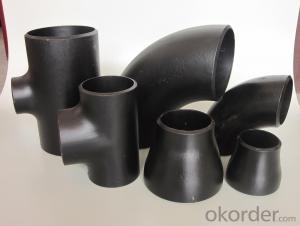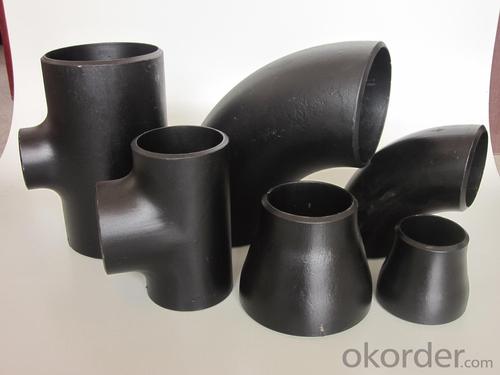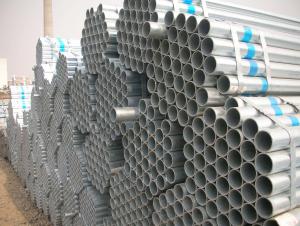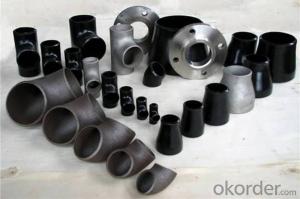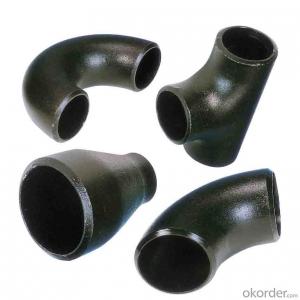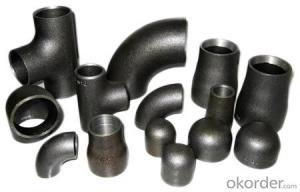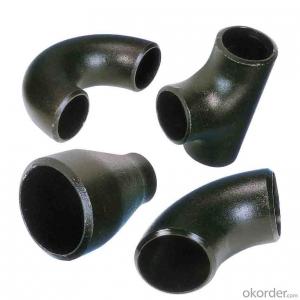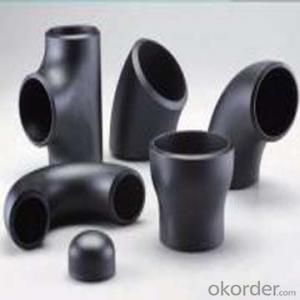20'' ELBOW TEE BEND FLANGE CARBON STEEL FITTINGS
- Loading Port:
- Tianjin
- Payment Terms:
- TT OR LC
- Min Order Qty:
- 5 m.t
- Supply Capability:
- 300 m.t/month
OKorder Service Pledge
OKorder Financial Service
You Might Also Like
Products Detailed Description
Products | pipe fittings elbows, bends,tees, reducers caps |
Size | 1/2" - 48" |
Wall thickness | Sch5-Sch160 XXS |
Standard | ANSI, ASME API5L, OCT, DIN and JIS, etc. |
we can also produce according to drawing and standards provided by customers. | |
Material | Carbon steel, alloy steel and stainless steel. |
We can produce according to materials appointed by consumers. | |
Packaging | Plywood Cases,plywood pallet, plastic bag or as customers requirement |
Surface Treatment | Shot blasted, rust-proof black oil |
Delivery Time | 10-60 days |
Quality | First grade |
Others | 1.Special design available according to your drawing. |
2.anti-corrosion and high-temperature resistant with black painting | |
3. All the production process are made under the ISO9001:2000 strictly. | |
4. A conformity rate of ex-factory inspection of products. |
Specifications
Ansi B16.9 WPB carbon steel pipe fitting elbow tee reducer
Size:Seamless 1/2"-24" Welded 1/2"-48"
ANSI B16.9 WPB carbon steel pipe fitting elbow tee reducer
1.Size: Seamless 1/2"-24" Welded 1/2"-48"
2. WT: SGP, STD, SCH40, SCH80, SCH100,SCH120,SCH160,XS,XXS
3. Material:
stainless steel Grade: 201,304,304L,316,316L,317,317L,904L,and etc
carbon steel Grade: WPB,GRB, Q235,16MN
Alloy steel: st35.8,st52,wp11,wp22,wp12 wp l6
4. Standard: ASTM/AISI/DIN/JIS
5. Type: Concentric and eccentric
6. Surface treatment: Transparent oil, rust-proof black oil
7. Applications range: Applications range: for use in the petroleum, smelting, foodstuff, power, papermaking, chemical, medical equipment,aviation, boiler heat exchanger, and other fields
8. Packing: wooden case or as per customers' requirement
- Q: How do you prevent freezing in steel pipes during cold weather?
- One effective way to prevent freezing in steel pipes during cold weather is to insulate the pipes. This can be done by applying foam insulation sleeves or wraps around the pipes. Additionally, ensuring that the pipes are properly sealed and any gaps or cracks are sealed can help prevent cold air from reaching the pipes. It is also important to keep the pipes warm by maintaining a consistent temperature in the surrounding area. This can be achieved by using a space heater or by allowing warm air to circulate around the pipes.
- Q: How do steel pipes compare to other materials in terms of cost?
- Steel pipes are generally more cost-effective compared to other materials due to their durability and longevity. While the initial investment may be higher, their lower maintenance and replacement costs make them a more economical choice in the long run. Additionally, steel pipes can withstand harsh environmental conditions and are less prone to corrosion, reducing the need for frequent repairs or replacements.
- Q: What is the difference between steel pipe and fiberglass pipe?
- Steel pipe and fiberglass pipe are two different types of materials used for piping systems. One major difference between steel pipe and fiberglass pipe is the material they are made of. Steel pipe is made from steel, which is an alloy of iron and carbon. It is known for its strength and durability, making it a popular choice for various applications, including plumbing, construction, and industrial projects. On the other hand, fiberglass pipe is made from glass fibers embedded in a resin matrix. This combination results in a lightweight and corrosion-resistant material, making it suitable for applications where chemical resistance is required, such as in the chemical industry or wastewater treatment plants. Another difference between steel pipe and fiberglass pipe is their flexibility. Steel pipe is known for its rigidity and stiffness, which makes it less flexible than fiberglass pipe. This rigidity can be an advantage in certain applications where stability and strength are crucial, such as underground infrastructure or high-pressure systems. Fiberglass pipe, on the other hand, offers more flexibility, allowing it to bend and conform to different shapes and contours. This flexibility makes it easier to install in tight spaces or areas with complex geometries. Corrosion resistance is another important difference between steel pipe and fiberglass pipe. Steel pipe is susceptible to corrosion, especially in environments with high moisture or chemical exposure. To protect against corrosion, steel pipes are often coated with a layer of protective material or lined with corrosion-resistant coatings. In contrast, fiberglass pipe is inherently corrosion-resistant due to the nature of the materials used in its construction. This makes fiberglass pipe a preferred choice for applications where corrosion is a concern, such as in saltwater environments or chemical processing plants. Cost is another factor that differentiates steel pipe and fiberglass pipe. Steel pipe is generally more affordable than fiberglass pipe, especially for smaller diameter pipes. However, as the diameter and pressure rating increase, the cost of steel pipe can become significantly higher than fiberglass pipe. Additionally, fiberglass pipe requires less maintenance and has a longer lifespan, which can offset the initial cost difference over time. In summary, the main differences between steel pipe and fiberglass pipe lie in the materials they are made of, their flexibility, corrosion resistance, and cost. Steel pipe offers strength and rigidity but is prone to corrosion, while fiberglass pipe is lightweight, flexible, corrosion-resistant, and often more expensive. The choice between these two types of pipes depends on the specific requirements of the project, including factors such as the application, environment, budget, and lifespan expectations.
- Q: What is the typical diameter range for steel pipes?
- The typical diameter range for steel pipes varies, but it typically falls between 1/2 inch to 48 inches.
- Q: How are steel pipes tested for leakage?
- Steel pipes are tested for leakage using various methods, including hydrostatic testing, pneumatic testing, and ultrasonic testing. Hydrostatic testing involves filling the pipe with water or another liquid and subjecting it to high pressure to check for any leaks. Pneumatic testing, on the other hand, involves pressurizing the pipe with air or gas to detect any leakage. Ultrasonic testing utilizes sound waves to identify any defects or leaks in the pipe by measuring the time it takes for the sound waves to bounce back. These testing methods ensure that steel pipes meet the required standards and are free from any leakage.
- Q: How do you protect steel pipes from external damage?
- To protect steel pipes from external damage, several measures can be taken. 1. Coating: Applying a protective coating on the surface of the steel pipes can help prevent external damage. Common coating options include epoxy, polyethylene, and fusion bonded epoxy (FBE) coatings. These coatings act as a barrier between the pipes and the surrounding environment, shielding them from corrosion, abrasion, and other external factors. 2. Cathodic Protection: This method involves using a sacrificial anode or impressed current to protect the steel pipes from corrosion. By connecting a less noble metal to the pipes, it attracts the corrosive elements, sacrificing itself instead of the pipes. This process helps extend the lifespan of the pipes and prevents external damage. 3. Wrapping and Taping: Wrapping the steel pipes with materials such as polyethylene or polypropylene tapes provides an extra layer of protection. These tapes act as a barrier against moisture, chemicals, and physical impact, safeguarding the pipes from external damage. Additionally, heat shrink sleeves can be used to provide insulation and protection against corrosion. 4. Underground Installation: Proper installation of steel pipes underground is crucial to protect them from external damage. This includes ensuring suitable trench depth, backfilling with appropriate materials, and avoiding excessive bending or stress on the pipes during installation. Proper bedding and padding techniques also contribute to the pipes' protection from external factors. 5. Regular Inspection and Maintenance: Periodic inspection and maintenance are essential to detect any signs of external damage early on. This can involve visual inspections, non-destructive testing, or even utilizing advanced technologies like pipeline integrity management systems. Timely repairs and maintenance can help prevent further damage and extend the lifespan of the steel pipes. Overall, protecting steel pipes from external damage requires a combination of preventative measures, proper installation techniques, and regular maintenance. By implementing these strategies, the pipes can be safeguarded against corrosion, abrasion, impact, and other factors that may compromise their integrity.
- Q: Can steel pipes handle extreme weather conditions?
- Steel pipes have a reputation for their capacity to withstand severe weather conditions. Steel, being a robust and durable material, can endure adverse environmental factors, including extreme temperatures, strong winds, heavy rainfall, and even catastrophic weather phenomena like hurricanes and tornadoes. The resilience and ability of steel pipes to withstand extreme weather conditions make them widely used in various industries and applications, such as water and sewage systems, oil and gas pipelines, and construction projects. Moreover, steel pipes can be coated or treated to enhance their resistance to corrosion, thereby further bolstering their ability to handle extreme weather conditions.
- Q: What are the different types of corrosion that can affect steel pipes?
- There are several types of corrosion that can affect steel pipes, including uniform corrosion, pitting corrosion, crevice corrosion, galvanic corrosion, and stress corrosion cracking.
- Q: What's the difference between No. 20 steel pipe and 27SiMn Steel Pipe?
- Cold plastic deformation and for bending, rolling, bending and hammer arch processing, arc welding and contact welding welding performance is good, when the thickness is small, prone to strict requirement of shape crack or complex shape parts. The cold or normalizing condition of cutting is better than that of annealing. It is generally used to make the material with little force and high toughness.
- Q: How do steel pipes perform in high-temperature applications?
- Steel pipes perform well in high-temperature applications due to their excellent heat resistance and structural integrity. The high melting point of steel allows it to withstand extreme temperatures without deformation or failure. Additionally, steel pipes have good thermal conductivity, which ensures efficient heat transfer in industrial processes.
Send your message to us
20'' ELBOW TEE BEND FLANGE CARBON STEEL FITTINGS
- Loading Port:
- Tianjin
- Payment Terms:
- TT OR LC
- Min Order Qty:
- 5 m.t
- Supply Capability:
- 300 m.t/month
OKorder Service Pledge
OKorder Financial Service
Similar products
Hot products
Hot Searches
Related keywords
